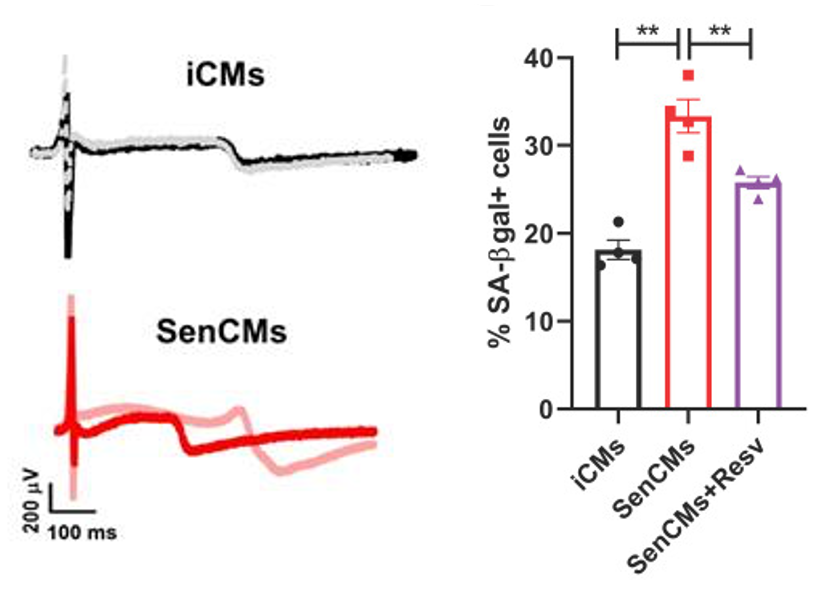Study Shows Resveratrol Slows Cardiac Aging via Senolytic Function
Italian scientists find that the anti-aging compound resveratrol mitigates markers of aging, including abnormal heart rhythms and senescent cells in a human heart model.
Highlights:
- Treatment with resveratrol restores the abnormal heart rhythms produced by aged cardiac cells.
- Resveratrol also diminishes senescent cells, acting as a senolytic — drug that eliminates senescent cells.
Partakers of wine have postulated that their drinking habits could benefit their health, as wine contains resveratrol, a powerful antioxidant associated with cardiovascular protection and slowing aging. While resveratrol comes naturally in other foods like peanuts and blueberries, the hope is that chronic consumption of red wine could be enough to take advantage of resveratrol.
In Theranostics, Lazzarini and colleagues from the Istituto Cardiocentro Ticino and the University of Milano-Bicocca in Italy report that resveratrol can mitigate aging in a human cardiac muscle cell model. By inducing senescence in cardiac muscle cells (CMs), the researchers recapitulate signs of aging such as abnormal heart rhythms and senescent cell buildup. They then show that resveratrol treatment mitigates these features of aging.
Resveratrol Reverses Signs of Cardiac Aging
Aging is associated with an increased incidence of abnormal heart rhythms (cardiac arrhythmias) and heart failure. To examine the effect of resveratrol on the aged heart, Lazzarini and colleagues generated a model for aged — senescent — CMs (SenCMs) and treated them with resveratrol. They then measured the electrical signal generated by clusters of CMs to look for heart rhythm abnormalities. They found that resveratrol partially restored abnormal heart rhythms in SenCMs, suggesting that resveratrol could mitigate age-related cardiac tissue dysfunction.

The processes underlying the abnormal heart rhythms associated with aging remain unclear, but the accumulation of senescent cells may play a role. Cells typically go into a senescent (growth-arrested, non-proliferating) state in response to cellular stress to stop cancer progression. However, as they accumulate with age, senescent cells can become harmful by promoting inflammation and damaging tissue. One of the only ways to get rid of senescent cells is with senoltyics — drugs that eliminate senescent cells.
Lazzarini and colleagues harnessed chemical stress (doxorubicin) to force some CMs into a senescent state. These SenCMs exhibited signs of aging, such as the abnormal heart rhythms shown above, thus recapitulating aspects of aged CMs. The Italian scientists then demonstrated that senescent cells could be reduced by resveratrol. These findings suggest that resveratrol could act as a senolytic. Also, this reduction in senescent cells potentially contributes to restoring the abnormal heart rhythms exhibited by the SenCMs.
Can Resveratrol Protect Our Heart?
Since resveratrol is contained in the skin of grapes, some have wondered if drinking wine could protect the heart from dysfunction. However, a study of nearly 80,000 Swedish individuals 45 to 83 years of age showed that drinking over 14 glasses of wine a week leads to an increased risk of atrial fibrillation, a deadly heart condition. Overall, the effect of wine on the heart is unclear. Still, many studies point to resveratrol improving the cardiac dysfunction associated with aging. However, a dose of about 1 gram per day is thought to be necessary to reap the benefits of resveratrol, and it would not be possible to consume enough wine to achieve this dose. Therefore, if resveratrol could really protect the heart against aging, it would have to be consumed through diet or supplementation.

